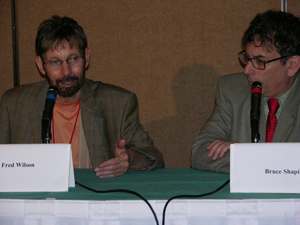 |
Von Maur survivor Fred Wilson, left, and Bruce Shapiro, executive director of the Dart Center for Journalism and Trauma, at the sixth annual Nebraska Behavioral Health Conference. Wilson said the December shooting that nearly took his life has significantly altered his view on life. |
“In a split second, I came so very close to death,” Wilson said. “It could’ve happened to anyone, anywhere, anytime.
“Since that day, I have such an enhanced appreciation for life. I feel it is my responsibility to deserve life.”
On Friday, July 18, Wilson spoke those words to nearly 200 mental health professionals during his keynote speech, “Forgiveness and the Fullness of Time,” at the sixth annual Nebraska Disaster Behavioral Health Conference.
Sponsored by the Nebraska Department of Health and Human Services, University of Nebraska Public Policy Center, UNMC’s Department of Psychiatry, BryanLGH Medical Center, Lincoln Metropolitan Medical Response System (LMMRS), Omaha Metropolitan Medical Response System (OMMRS) and The Center for Biopreparedness Education, the conference was held at the Embassy Suites Hotel, 555 S. 10th Street, in downtown Omaha.
The goal of the conference was to provide proper training for mental health professionals to effectively respond in the event of a disaster.
“I think that the events of the past eight months here have made it very clear that disaster behavioral health emergencies occur and that the skills to respond are needed,” said Robin Zagurski, a clinical social worker in UNMC’s psychiatry department. “Clinicians who have not had disaster training are at greater risk for developing disaster-related mental health problems after responding to a disaster.
“Clinicians who come to our conference can learn from others who have responded to recent national and international disasters,” said Zagurski, who has provided mental health assistance to families of Von Maur and Little Sioux tornado victims.
|
|
Shapiro, who went from crime reporter to crime victim when he was injured in a mass stabbing in 1994 and nearly died, was able to offer a unique viewpoint on the subject.
“I have the very interesting experience of going from being the reporter covering crime, to being the story,” he said. “It’s important for the media to tell those stories, but journalists need to remember it’s not just about the blood and guts on day one, but the ripples in the community after that. There is an act II.”
Wilson’s focus is on act II right now as he relearns everyday tasks using only his non-dominant, left hand. So far, he can eat spaghetti and tie his own tie, but laments that he is unable to wrap gifts, a task he treasured before the shooting.
The 61-year-old recently returned to Von Maur part-time, working in the same spot he lay dying mere months ago.
“I know exactly where the shooter stood, where I was standing, where I fell, but it does not bother me (to work there). It does not haunt me,” he said, repeating it for emphasis. “It does not haunt me.”
Other speakers at the conference included:
- Al Berndt, assistant director of the Nebraska Emergency Management Agency;
- Brian Flynn, Ed.D., associate director of the Center for the Study of Traumatic Stress, adjunct professor of psychiatry at Uniformed Services University of Health Sciences;
- Andrew Klatte, assistant deputy director of the Office of Emergency Preparedness, Indiana Division of Mental Health and Addiction;
- John Filippi, D.D.S., board certified forensic odontologist.